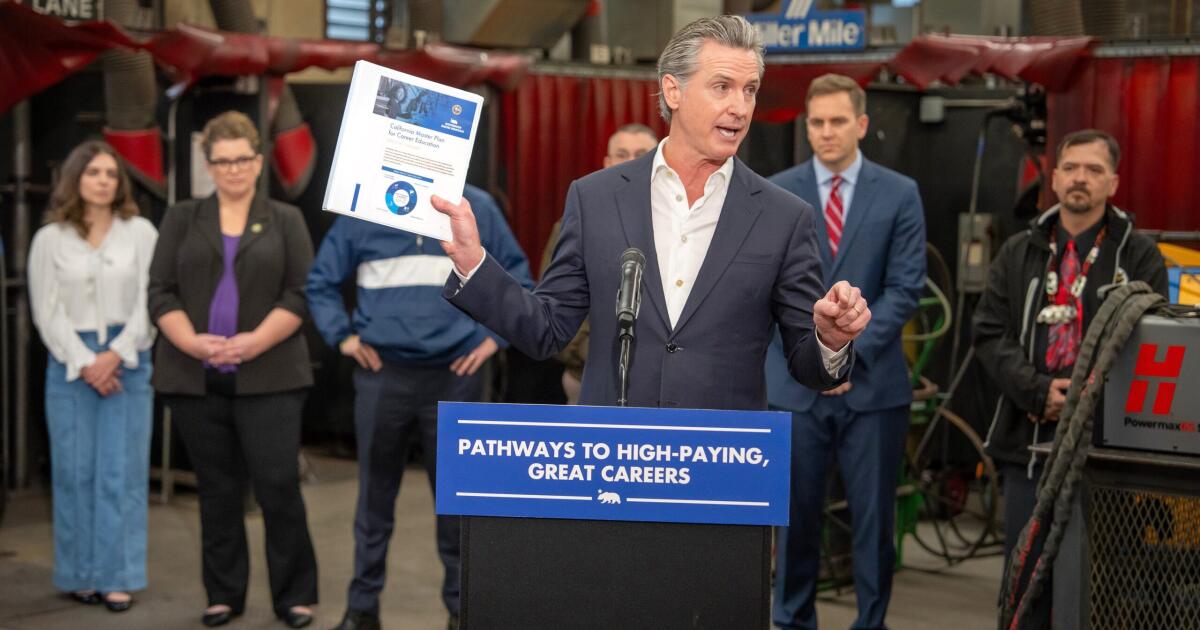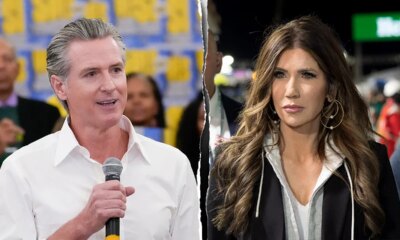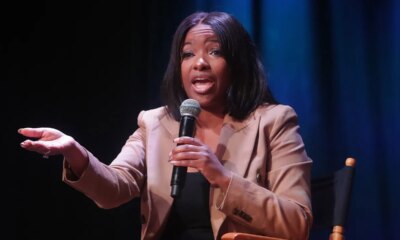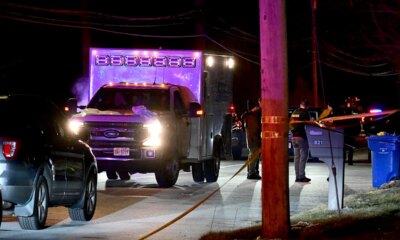Politics
Column: Newsom is acting more like a governor should. Will that boost his White House prospects?

For a good deal of this election cycle, Gavin Newsom acted very much like a person wanting to be president.
He traveled the country and ran TV ads. He raised billboards and debated Florida’s Republican governor on national TV, just a few weeks before Ron DeSantis’ campaign crumpled in a humiliating heap.
The not-really campaign was never an actual, serious run for the White House. First Joe Biden and then (o, bitter pill!) his sometime friend, sometime rival Kamala Harris stood in Newsom’s way. It was more like California’s restive governor was letting his ego loose for a bit of an off-leash romp.
Things changed after Nov. 5, following Donald Trump’s triumph and California’s notable shift toward the center-right on election day. Suddenly, Newsom started appearing in places such as Bakersfield, Redding and Colusa, among the ruddiest parts of red California.
It’s something the governor should have done a long time ago, rather than strutting and preening on the national stage. There are millions of Californians — politically outnumbered, geographically far-flung — who have long felt derided or ignored by Sacramento.
But give credit where due. Newsom is showing up.
And if he’s interested in really, truly running for president in 2028 — when the Democratic contest looks to be a wide-open affair — it’s not a bad place to start.
The program Newsom has been pitching of late, the “Jobs First Economic Blueprint,” has been in the works for some time.
In promotional materials, the governor’s office describes the program as a “bottom-up strategy for creating good-paying jobs and regional economic development.” The plan follows lengthy consultation with locals in 13 parts of the state and aims to streamline programs and spur economic growth through a series of tailor-made initiatives.
The unveiling in the red reaches of California was no accident.
With Trump’s victory, Democrats have begun to reckon ever more seriously with their diminished standing among union members and working-class voters and the party’s catastrophic collapse — decades in the making — across rural America. There’s a new urgency “to solve problems and meet people where they are,” as David McCuan, a Sonoma State political science professor and longtime student of state politics, put it.
In California, that means venturing beyond the politically comfortable climes of Los Angeles and the San Francisco Bay Area into the hostile interior, and extending what Newsom described during a recent appearance in Redding as “an open hand, not a closed fist.” (The event at Shasta College, unveiling a plan to create better job opportunities for those without college degrees, even drew the rare presence of a GOP lawmaker, local Assemblywoman Heather Hadwick.)
It’s exactly what the governor should be doing. Seeing and being seen in red California sends a message to fellow Democrats as they puzzle out a way forward. More importantly, it tells those living outside the state’s big cities and sprawling suburbs they matter and their cares aren’t being overlooked.
Those close to the governor say Newsom is in a much better place now than the pouty, sulky space he occupied in the months after President Biden stepped aside and anointed Harris as his successor.
It’s not just the sidelining — for the time being anyway — of the vice president, who clearly bested Newsom in their unspoken, years-long competition. There is also a renewed sense of purpose with Trump returning to the White House and California poised to emerge, once more, at the vanguard of the political opposition, with Newsom in the lead.
No one, perhaps not even the governor himself, knows whether he will attempt a genuine, full-fledged try for the White House in 2028. But there are things he can do in the meantime to better position himself if he decides to do so.
Chief among them is ending his term a little over two years from now with a sheen of success. And that means spending more time in places like Ione and Newcastle than Iowa and New Hampshire. (You can find those tiny towns in Amador and Placer counties, respectively.)
There may be no small element of fantasy in the talk of Newsom as a serious presidential contender.
Having just lost the White House with one San Francisco-incubated nominee atop their ticket, it seems quite unlikely that Democrats will turn to Newsom, another of that ilk, to be the party’s savior four years hence.
But who knows? With a twice-impeached convicted felon preparing to take the presidential oath for a second time, it’s impossible to rule anything out.
Newsom’s red-state rambles may end up having no effect whatsoever on his political future.
But they can’t hurt.

Politics
Video: Federal Agent Fatally Shoots Woman in Minneapolis

new video loaded: Federal Agent Fatally Shoots Woman in Minneapolis
transcript
transcript
Federal Agent Fatally Shoots Woman in Minneapolis
Federal officials claimed that the 37-year-old woman was trying to kill agents with a car in Minneapolis, while city and state officials disputed their account.
-
“No! No! Shame — shame! What did you do?” “It was an act of domestic terrorism, what happened. It was — our ICE officers were out in an enforcement action. They got stuck in the snow because of the adverse weather that is in Minneapolis. They were attempting to push out their vehicle, and a woman attacked them and those surrounding them, and attempted to run them over and ram them with her vehicle. An officer of ours acted quickly and defensively shot to protect himself and the people around him.” “We’ve been warning for weeks that the Trump administration’s dangerous, sensationalized operations are a threat to our public safety.” “They are already trying to spin this as an action of self-defense. Having seen the video of myself, I want to tell everybody directly: That is bullshit. This was an agent recklessly using power that resulted in somebody dying — getting killed.” “Get out of the fucking car.” “No! No! Shame! [gunshots] Shame! Oh, my fucking God. What the fuck? What the fuck? You just fucking — what the fuck did you do?” “There is nothing to indicate that this woman was the target of any law enforcement investigation or activity. This woman was in her car, and it appears, then blocking the street because of the presence of federal law enforcement, which is obviously something that has been happening not just in Minneapolis, but around the country.”

By Jamie Leventhal and Devon Lum
January 7, 2026
Politics
Trump greenlights Russian sanctions bill, paving way for 500% tariff on countries supporting Moscow: Graham

NEWYou can now listen to Fox News articles!
Sen. Lindsey Graham announced Wednesday that President Donald Trump has approved a Russian sanctions bill designed to pressure Moscow to end its war with Ukraine.
Graham revealed the development in a post on X, describing it as a pivotal shift in the U.S. approach to the Russia-Ukraine conflict.
“After a very productive meeting today with President Trump on a variety of issues, he greenlit the bipartisan Russia sanctions bill that I have been working on for months with Senator Blumenthal and many others,” Graham said.
“This will be well-timed, as Ukraine is making concessions for peace and Putin is all talk, continuing to kill the innocent.”
TRUMP TOUTS ‘TREMENDOUS PROGRESS’ BUT SAYS HE’LL MEET PUTIN AND ZELENSKYY ‘ONLY WHEN’ PEACE DEAL IS FINAL
Sen. Lindsey Graham, R-S.C., speaks during a news conference at the U.S. Capitol July 31, 2024, in Washington, D.C. (Kent Nishimura/Getty Images)
According to the Sanctioning Russia Act of 2025, the bipartisan legislation is designed to grant Trump sweeping, almost unprecedented, authority to economically isolate Russia and penalize major global economies that continue to trade with Moscow and finance its war against Ukraine.
Most notably, the bill would require the United States to impose a 500% tariff on all goods imported from any country that continues to purchase Russian oil, petroleum products or uranium. The measure would effectively squeeze Russia financially while deterring foreign governments from undermining U.S. sanctions.
TRUMP CASTS MADURO’S OUSTER AS ‘SMART’ MOVE AS RUSSIA, CHINA ENTER THE FRAY
President Donald Trump speaks during a meeting at the White House Oct. 14, 2025, in Washington, D.C. (Kevin Dietsch/Getty Images)
“This bill will allow President Trump to punish those countries who buy cheap Russian oil fueling Putin’s war machine,” Graham said.
“This bill would give President Trump tremendous leverage against countries like China, India and Brazil to incentivize them to stop buying the cheap Russian oil that provides the financing for Putin’s bloodbath against Ukraine.”
Graham said voting could take place as early as next week and that he is looking forward to a strong bipartisan vote.
US MILITARY SEIZES TWO SANCTIONED TANKERS IN ATLANTIC OCEAN
The vessel tanker Bella 1 was spotted in Singapore Strait after U.S. officials say the U.S. Coast Guard pursued an oil tanker in international waters near Venezuela. (Hakon Rimmereid/via Reuters)
The move on the Russian sanctions bill follows another sharp escalation in America’s clampdown on Moscow. Earlier Wednesday, U.S. forces reportedly seized an oil tanker attempting to transport sanctioned Venezuelan oil to Russia.
CLICK HERE TO DOWNLOAD THE FOX NEWS APP
Graham publicly celebrated the seizure in another post on X, describing it as part of a broader winning streak of U.S. intervention aimed at Venezuela and Cuba.
In the post, he also took aim at critics such as Sen. Rand Paul, who has opposed the bill, arguing that it would damage America’s trade relations with much of the world.
Fox News Digital reached out to the White House for comment.
Politics
ICE officer kills a Minneapolis driver in a deadly start to Trump’s latest immigration operation

An Immigration and Customs Enforcement officer shot and killed a Minneapolis driver on Wednesday during the Trump administration’s latest crackdown on a major American city — a shooting that federal officials said was an act of self-defense but that the mayor described as reckless and unnecessary.
The 37-year-old woman was shot in front of a family member during a traffic stop in a snowy residential neighborhood south of downtown Minneapolis, just a few blocks from some of the oldest immigrant markets and about a mile from where George Floyd was killed by police in 2020. Her killing quickly drew a crowd of hundreds of angry protesters.
Homeland Security Secretary Kristi Noem, while visiting Texas, described the incident as an “act of domestic terrorism” carried out against ICE officers by a woman who “attempted to run them over and rammed them with her vehicle. An officer of ours acted quickly and defensively, shot, to protect himself and the people around him.”
Emergency medical technicians carry a person on a stretcher at the scene of a shooting in Minneapolis on Wednesday.
(Ellen Schmidt / Associated Press)
But Minneapolis Mayor Jacob Frey blasted that characterization as “garbage” and criticized the federal deployment of more than 2,000 officers to the Twin Cities of Minneapolis and St. Paul as part of the immigration crackdown.
“What they are doing is not to provide safety in America. What they are doing is causing chaos and distrust,” Frey said, calling on the immigration agents to leave. “They’re ripping families apart. They’re sowing chaos on our streets, and in this case, quite literally killing people.
“They are already trying to spin this as an action of self-defense. Having seen the video myself, I wanna tell everybody directly, that is bullshit,” the mayor said.
Frey said he had a message for ICE: “Get the f— out of Minneapolis.”

Police tape surrounds a vehicle believed to be involved in a shooting by an ICE agent on Wednesday.
(Stephen Maturen / Getty Images)
A shooting caught on video
Videos taken by bystanders with different vantage points and posted to social media show an officer approaching an SUV stopped across the middle of the road, demanding the driver open the door and grabbing the handle. The Honda Pilot begins to pull forward, and a different ICE officer standing in front of the vehicle pulls his weapon and immediately fires at least two shots into the vehicle at close range, jumping back as the vehicle moves toward him.
It was not clear from the videos whether the vehicle made contact with the officer. The SUV then sped into two cars parked on a curb nearby before crashing to a stop. Witnesses screamed obscenities, expressing shock at what they’d seen.
After the shooting, emergency medical technicians tried to administer aid to the woman.
-
Share via
“She was driving away and they killed her,” said resident Lynette Reini-Grandell, who was outdoors recording video on her phone.
The shooting marked a dramatic escalation of the latest in a series of immigration enforcement operations in major cities under the Trump administration. The death of the Minneapolis driver, whose name wasn’t immediately released, was at least the fifth linked to immigration crackdowns.
The Twin Cities have been on edge since DHS announced Tuesday that it had launched the operation, which is at least partly tied to allegations of fraud involving Somali residents. Noem confirmed Wednesday that DHS had deployed more than 2,000 officers to the area and said they had already made “hundreds and hundreds” of arrests.

Protesters react after being hit with chemical spray at the scene of a shooting in Minneapolis.
(Alex Kormann / Minnesota Star Tribune via AP)
A large throng of protesters gathered at the scene after the shooting, where they vented their anger at the local and federal officers who were there, including Gregory Bovino, a senior U.S. Customs and Border Patrol official who has been the face of crackdowns in Los Angeles, Chicago and elsewhere.
In a scene that hearkened back to the Los Angeles and Chicago crackdowns, bystanders heckled the officers, chanting “Shame! Shame! Shame!” and “ICE out of Minnesota,” and blew whistles that have become ubiquitous during the operations.
Shootings involving drivers during immigration actions have been an issue since the raids began in Southern California.
In August, masked U.S. Customs and Border Protection agents in San Bernardino opened fire on a truck they had stopped on a street. A video showed an agent demanding the driver roll down his window. When he refused, an agent shattered the window, the truck drove off and gunfire rang out.
When the driver got home, the family reported the incident to police. Federal authorities alleged an agent had been injured when the driver tried to “run them down.” But witnesses and video disputed some aspects of the official account.
In October, a well-known TikTok figure was shot by an agent during a standoff in Los Angeles. The U.S. attorney said the man rammed his vehicle into the law enforcement vehicles in front of and behind him, “spun the tires, spewing smoke and debris into the air, causing the car to fishtail and causing agents to worry for their safety.” But videos showed a much more complicated view of the situation. A federal judge recently dismissed the case against the driver, finding that he had been denied access to counsel while in immigration detention.
Governor calls for calm
In Minnesota on Wednesday, Gov. Tim Walz said he was prepared to deploy the National Guard if necessary. He said a family member of the driver was there to witness the killing, which he described as “predictable” and “avoidable.” He also said that, like many, he was outraged by the shooting but called on people to keep protests peaceful.
“They want a show. We can’t give it to them. We cannot,” the governor said during a news conference. “If you protest and express your 1st Amendment rights, please do so peacefully, as you always do. We can’t give them what they want.”
Minneapolis Police Chief Brian O’Hara briefly described the shooting to reporters but, unlike federal officials, gave no indication that the driver was trying to harm anyone. He said she had been shot in the head.
“This woman was in her vehicle and was blocking the roadway on Portland Avenue. … At some point a federal law enforcement officer approached her on foot and the vehicle began to drive off,” the chief said. “At least two shots were fired. The vehicle then crashed on the side of the roadway.”
There were calls on social media to prosecute the officer who shot the driver. Commissioner Bob Jacobson of the Minnesota Department of Public Safety said state authorities would investigate the shooting with federal authorities.
“Keep in mind that this is an investigation that is also in its infancy. So any speculation about what has happened would be just that,” Jacobson told reporters.
The shooting happened in the district of Democratic Rep. Ilhan Omar, who called it “state violence,” not law enforcement.
For nearly a year, migrant rights advocates and neighborhood activists across the Twin Cities have been preparing to mobilize in the event of an immigration enforcement surge. From houses of worship to mobile home parks, they have set up active online networks, scanned license plates for possible federal vehicles and bought whistles and other noise-making devices to alert neighborhoods of any enforcement presence.
Sullivan and Dell’Orto write for the Associated Press. Dell’Orto reported from St. Paul, Minn. AP writers Steve Karnowski in Minneapolis, Ed White in Detroit, Valerie Gonzalez in Brownsville, Texas, and Mark Vancleave in Las Vegas and Times staff contributed to this report.
-

 Detroit, MI5 days ago
Detroit, MI5 days ago2 hospitalized after shooting on Lodge Freeway in Detroit
-

 Dallas, TX3 days ago
Dallas, TX3 days agoDefensive coordinator candidates who could improve Cowboys’ brutal secondary in 2026
-

 Technology2 days ago
Technology2 days agoPower bank feature creep is out of control
-

 Health4 days ago
Health4 days agoViral New Year reset routine is helping people adopt healthier habits
-

 Nebraska1 day ago
Nebraska1 day agoOregon State LB transfer Dexter Foster commits to Nebraska
-

 Politics4 days ago
Politics4 days agoDan Bongino officially leaves FBI deputy director role after less than a year, returns to ‘civilian life’
-

 Nebraska2 days ago
Nebraska2 days agoNebraska-based pizza chain Godfather’s Pizza is set to open a new location in Queen Creek
-

 Louisiana3 days ago
Louisiana3 days agoInternet company started with an antenna in a tree. Now it’s leading Louisiana’s broadband push.



















